Civil Rights / Cold War
How They Voted
Unlike most Deep South states, Tennessee was politically moderate and continued to be so throughout the 1950s and 1960s with occasional exceptions.
Most counties voted according to tradition during presidential elections between 1944 and 1964. Republicans did well in East Tennessee and along the Western Highland Rim. Democrats won in Middle and West Tennessee.
Overall, the state tended to vote for Republicans in national elections. For example, Tennesseans chose Dwight Eisenhower over Adlai Stevenson in 1952 and 1956. Richard Nixon won Tennessee even though John Kennedy was elected president in 1960. Nixon also received the most state votes in 1968 and 1972.
The only Democratic presidential candidate to win in Tennessee between 1952 and 1975 was Lyndon B. Johnson in 1964. In the 1968 election, Nixon won the state with 38 percent of the vote, but George Wallace, an independent candidate known for his racist political past, came in second with 34 percent. The Democratic candidate Hubert Humphrey received 28 percent of the votes.
Both Democrats and Republicans in Tennessee were conservative before World War II. During the war however, a third progressive political order emerged under the leadership of Democratic Senator Estes Kefauver. His legacy continued to affect politics in Tennessee even after his death in 1963.
Kefauver was able to gain support from new interest groups including women, organized labor, veterans, urban voters, and blacks. This helped bring about a more moderate Democratic Party in Tennessee from the 1950s onward. Other moderate Democrats included Senator Al Gore, Sr., and Governors Frank Clement and Buford Ellington.
Black leaders
A large number of blacks in Tennessee were already able to vote after World War II, largely because black and white registration rates in Memphis were surprisingly equal. Before the war, Democrat Edward H. Crump’s political machine encouraged the city’s large black population to vote, so long as it supported his candidates.
Republican leaders
As the 1960s ended, Republicans began to attract Tennesseans who feared change tied to civil rights and anti-war protest movements. In 1970, they chose moderate Republican Winfield Dunn from Memphis as the governor. Dunn was the first Republican governor to be elected in 50 years.
Black leaders
A large number of blacks in Tennessee were already able to vote after World War II, largely because black and white registration rates in Memphis were surprisingly equal. Before the war, Democrat Edward H. Crump’s political machine encouraged the city’s large black population to vote, so long as it supported his candidates.
One black Republican leader, Robert R. Church, Jr., from Memphis was not under the Crump machine control. Church's Lincoln League helped elect Eisenhower in the 1950s. In Chattanooga and Nashville, strong organizations of black Republicans were led by Walter C. Robinson and James C. Napier respectively.
Republican leaders
As the 1960s ended, Republicans began to attract Tennesseans who feared change tied to civil rights and anti-war protest movements. In 1970, they chose moderate Republican Winfield Dunn from Memphis as the governor. Dunn was the first Republican governor to be elected in 50 years.
Several Tennesseans received national attention during the Watergate hearings in 1974. Tennessee Senator Howard Baker Jr. served as vice chairman of the committee investigating the Watergate break-ins. He became famous for asking the key question at the hearings, "What did the President know, and when did he know it?" Baker later served Senate minority leader, and then majority leader in 1980.
Tennessean Fred Thompson served on the Watergate Committee as a legal adviser. James F. Neal, born in Sumner County, gained fame for his successful prosecution of Attorney General John Mitchell in the Watergate scandal. Sadly, Watergate helped to erode public faith in government, a trend that has continued.
For more information about Tennessee politicians, click their name.
Picture Credits:
- Photograph of Senator Estes Kefauver and Albert Gore, Sr. Tennessee State Museum Collection, 2005.51.10.4
- Photograph of “Boss” Edward H. Crump with Frank Clement shaking hands. Courtesy of the University of Memphis Special Collections
- Photograph of Richard M. Nixon and Elvis Presley. U.S. Federal Government Photograph.
- Photograph of a political rally for Frank Clement held in Johnson City during the 1950s. Courtesy of the Johnson's Depot, Historic Photos of Johnson City online at www.stateoffranklin.net/johnsons/photos6.htm
- Senator Howard Baker (center) and Fred Thompson (left), both Tennesseans, listen to Committee Chair Sam Ervin at the Watergate hearings in 1973. Baker was the leading Republican on the committee while Thompson was a legal advisor. Photograph courtesy of the Sam J. Ervin Library & Museum
- Gov. Winfield Dunn talks in a committee hearing. Photograph courtesy of Tennessee Tech/ Cooper/Dunn Hall
- President Lyndon Johnson waves to a crowd in downtown Nashville during a 1964 presidential campaign stop. Courtesy of Purity Dairies LLC
Civil Rights / Cold War >> Everyday Life >> How They Lived >> How They Voted
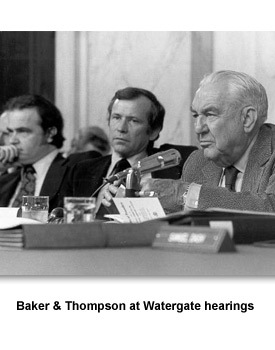
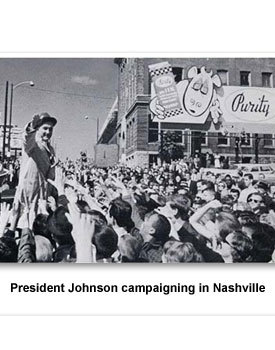
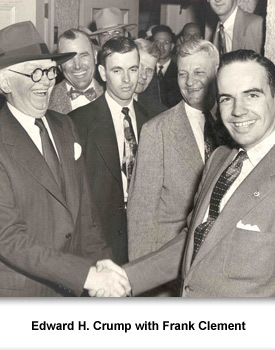
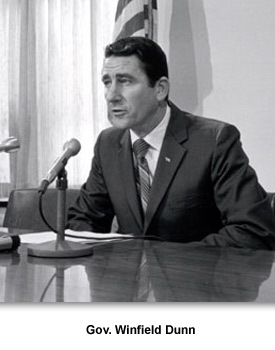
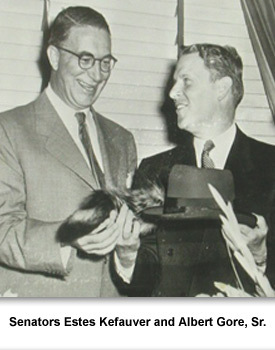
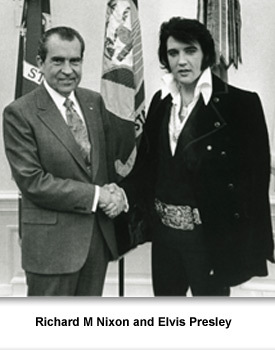
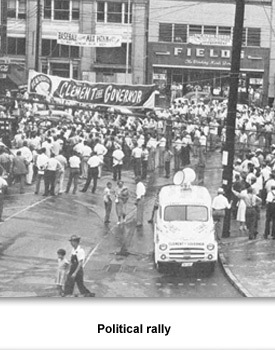
 Sponsored by: National Endowment for the Humanities
Sponsored by: National Endowment for the Humanities